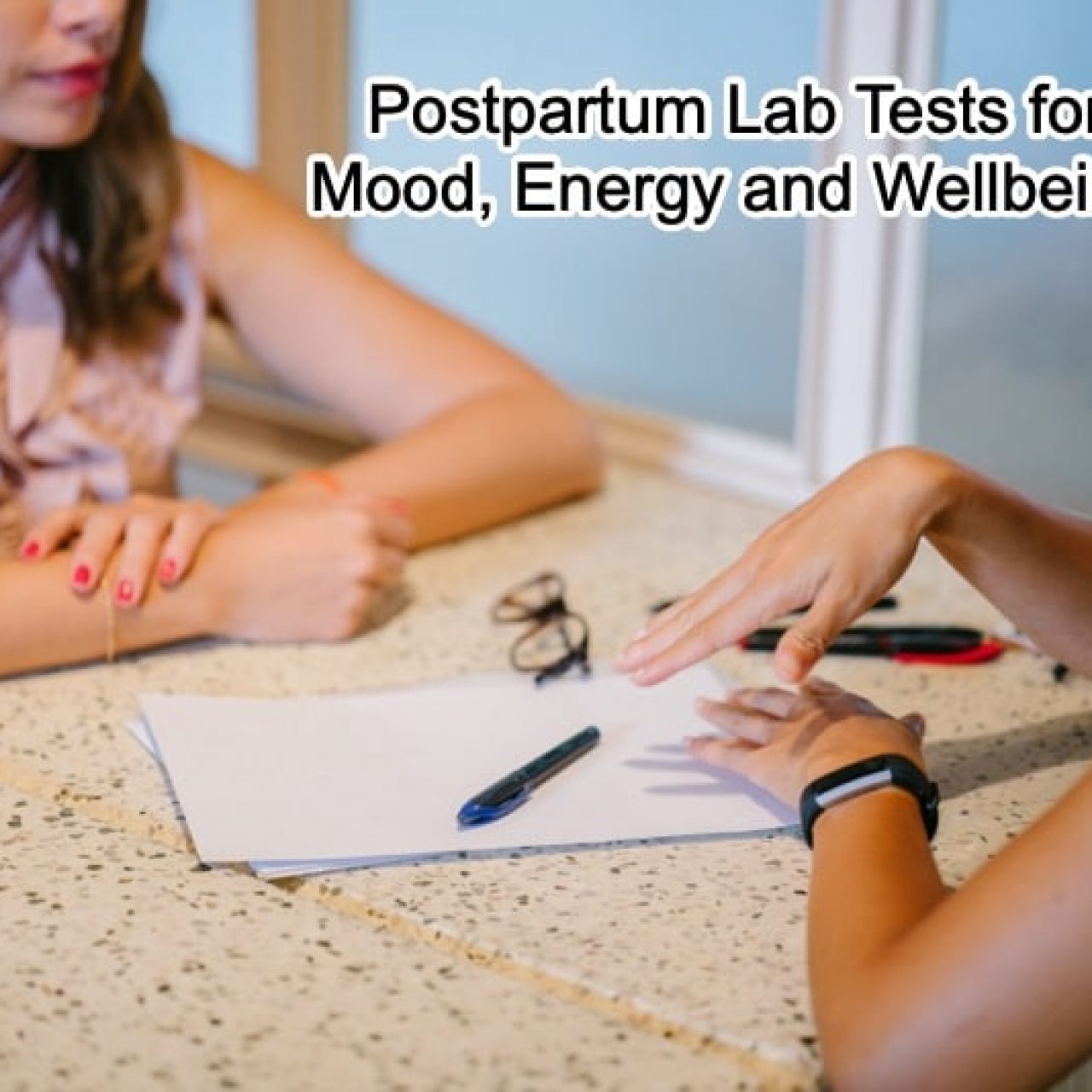Many women feel that they’re properly supported and cared for along their journey while they’re pregnant. Unfortunately, they often feel that as soon as their little one arrives, that focus shifts away from them and onto their newborn.
Are you in your fourth trimester and experiencing fatigue, anxiety, low mood, or any other symptoms? If so, it’s important not to assume it’s just the reality of being a new mom. Your health is just as important now as it was while pregnant or trying to conceive! Here is the list of tests I run frequently to support health during the post-partum period.
CBC & Ferritin (Iron)
Iron deficiency anemia is very common in pregnancy. This is because of the increased blood production needed to bring oxygen to a growing baby. Make sure to take a good prenatal vitamin containing iron throughout pregnancy, and while breastfeeding.
Low iron can cause fatigue, heart palpitations, and shortness of breath. Research also finds that low iron in the post-partum period is associated with low mood and post-partum depression (PPD)1,2. Studies have found that supplementing with iron in the post-partum period decreased the risk of PPD1. In one study, iron treatment resulted in a 25% improvement in a mother’s depression and anxiety levels in those who were previously iron deficient2.
Vitamin D
Just like with iron, studies suggest that there is a connection between Vitamin D status in both antenatal and post-natal depression3. I recommended testing Vitamin D levels when trying to conceive, as well as in the post-partum period3. There’s also lots of research supporting testing Vitamin D to support fertility, and reduce miscarriage risk! .
Thyroid (TSH, Free T4, Free T3, Antibodies)
Post-partum is a common time for the thyroid gland to act up. A condition known as post-partum thyroiditis can occur in up to 2 in 25 women in the year post partum4. This type of thyroiditis involves widespread inflammation in the thyroid gland. It typically causes hyperthyroidism early on, such as rapid weight loss, loose stools, heart palpitations, and anxiety4. A full thyroid panel should be run for women experiencing any of these symptoms.
It’s also quite common for post-partum thyroiditis to start with hyperthyroidism symptoms, but lead to hypothyroidism later on in the process. Hypothyroidism has a wide range of symptoms but may include fatigue, constipation, cold hands and feet, brain fog, and weight gain.
In addition to this, the presence of thyroid antibodies in pregnancy—namely Anti TPO—in has been associated with post-partum depression5.
Other Considerations
Post-partum is also a time where a woman’s immune system shifts. If you’re experiencing new onset of joint pain in the post-partum period, talk to your health care provider about testing immune markers. These should include hs-CRP, ESR, RF, ANA and thyroid antibodies Anti TG and Anti TPO.
If you’ve been diagnosed with PCOS or experienced gestational diabetes, I also suggested running your fasting glucose and fasting insulin.
References
- Wassef, A., Nguyen, Q. and St-André, M., 2018. Anemia and depletion of iron stores as risk factors for postpartum depression: a literature review. Journal of Psychosomatic Obstetrics & Gynecology, [online] 40(1), pp.19-28. Available at: <https://pubmed.ncbi.nlm.nih.gov/29363366/>.
- Beard, J., Hendricks, M., Perez, E., Murray-Kolb, L., Berg, A., Vernon-Feagans, L., Irlam, J., Isaacs, W., Sive, A. and Tomlinson, M., 2005. Maternal Iron Deficiency Anemia Affects Postpartum Emotions and Cognition. The Journal of Nutrition, [online] 135(2), pp.267-272. Available at: <https://pubmed.ncbi.nlm.nih.gov/15671224/>.
- Aghajafari, F., Letourneau, N., Mahinpey, N., Cosic, N. and Giesbrecht, G., 2018. Vitamin D Deficiency and Antenatal and Postpartum Depression: A Systematic Review. Nutrients, [online] 10(4), p.478. Available at: <https://pubmed.ncbi.nlm.nih.gov/29649128/>.
- Postpartum Thyroiditis. [online] Available at: <https://www.hopkinsmedicine.org/health/conditions-and-diseases/postpartum-thyroiditis> [Accessed 15 May 2021].
- Kuijpens, J., Vader, H., Drexhage, H., Wiersinga, W., van Son, M. and Pop, V., 2001. Thyroid peroxidase antibodies during gestation are a marker for subsequent depression postpartum. European Journal of Endocrinology, [online] pp.579-584. Available at: <https://eje.bioscientifica.com/view/journals/eje/145/5/579.xml>.





